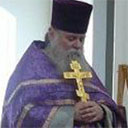We commemorate each October the memory of two saints of the North American Church, St Tikhon and St Innocent. St Tikhon was archbishop of our American Church from 1898 to 1907 He was later elected Patriarch of Moscow just as the Bolshevik took power, and he guided the Russian Church through the first persecutions under the Communist regime. He was the focus of the atheists’ attacks on the Church, enduring physical and psychological mistreatment, imprisonment, threats and abuse from government thugs and renegade clerics – a multitude of afflictions, which ended only with his death under suspicious circumstances in 1925.
St Innocent served many years as a missionary priest in the Aleutian Islands before he was named the first Orthodox bishop on this continent in 1840. He endured many hardships in the mission field, going from island to island, serving the spiritual needs of a parish spread over hundreds of miles. He eventually rose to become Metropolitan of Moscow. The travails he endured during the earlier period permanently injured his health. Yet his work endured, and the presence of Orthodoxy in America is a monument to his diligence and devotion.
The lives of these two holy men illustrate contrasting facets of Christ’s work, of the priesthood, and of the vocation we all share as Orthodox Christians. The ministry in the world of our Lord Jesus Christ had two very different, almost contradictory, aspects. On the one side there was the wonder of His miracles, the glory of His teaching, and the admiration which His healing and teaching evoked among the people. On the other side, the prophets speak of Christ as a “man of sorrows” (Isaiah 53: 3), and the Gospels tell of opposition and rejection His ministry culminates in the humiliation and agony of His crucifixion. Christ came to teach and to heal, and to proclaim Himself as the future Kingdom of heaven already present. He crowned His ministry, however, not with glory and adulation, but with voluntary sacrifice. He was crucified so that He might rise from the dead and ascend to the Father; both the sacrifice and the glory were necessary parts of His plan to redeem and save us.
The office of bishop, which St Innocent and St Tikhon shared, reflects the same paradox. We offer our bishops honor and respect as the successors of the apostles; we acknowledge the special role they perform in the Church and the authority which necessarily accompanies their position. They are living icons of our Lord’s presence in the Church. As such they shepherd His Flock, preside over the Church’s worship, and preserve pure and undefiled her doctrine and morals. Their goal is to imitate the Good Shepherd, from whom they derive their office.
Christ, however, demands that His clergy also follow Him in His sacrifice as they do in teaching and authority They are called to lead the Church by influence and example, not to govern it by command They are also commissioned to be His witnesses before the world St Innocent, through his labors, and St Tikhon, through his tribulations and martyrdom, literally offered themselves as “living sacrifices” for our Faith. They bore witness with their very lives to the truth of the Gospel and the reality of God’s Kingdom. Every good priest must likewise be a martyr for Christ and His Kingdom, if only in a spiritual sense.
Glory and martyrdom, however, are not reserved for the clergy or the saints The splendor of celebrating the Lord’s presence and the sacrifice of witnessing to His Kingdom are not confined to the clergy. St Peter refers to the Church as a whole, both clergy and laity, as “a royal priesthood” (I Peter 2: 9). As the clergy symbolize Christ’s presence in the Church, so the Church reminds the world of the Savior’s presence now and of His future return.
At the blessing of the Gifts of bread and wine in the Divine Liturgy, the priest asks the Father to send down the Holy Spirit “upon us and upon these Gifts here offered.” Thus he prays that, through the holy Mysteries, the Spirit will sanctify us and encourage us in our witness. The Lord Himself declares that we are the light of the world (Matthew 5:14; see also Philippians 2:15), then identifies our work with His own by calling Himself the Light of the world (John 8:12; 9:5). He affirms that we are to be like salt (Matthew 5:13), a pungent reminder of Christ’s love for the world and His desire for its salvation. We are to be the yeast (Matthew 13:33) which causes the world to ferment, seething and churning in anticipation of His return. St Paul expresses the same idea through a different image, that of childbirth: “For the earnest expectation of the creation eagerly waits for the revealing of the sons of God . . . For we know that the whole creation groans and labors with birth pangs together until now . . . Even we ourselves groan within ourselves, eagerly waiting for the adoption, the redemption of our body … We eagerly wait for it with perseverance” (Romans 8:19,23-25).
Sts Innocent and Tikhon certainly understood the two-fold nature of their vocation as bishops and as Orthodox Christians. This awareness enabled them to be effective leaders, inspiring examples, and powerful witnesses to their contemporaries and to us now This same awareness also leads us into a new and fuller participation in the Gospel. We too embrace the glory and grace which Christ offers to us through our life in the Church. Here the Spirit sanctities us in baptism and Chrismation, renews and nourishes us in Holy Communion, cleanses us in confession, and strengthens and deepens our commitment in prayer, study, and good works. In His Church also He confirms us in our witness. Thus we celebrate in our words and deeds our Savior’s death and Resurrection We proclaim in our lives His presence now and His Kingdom which is to come.
***


